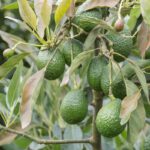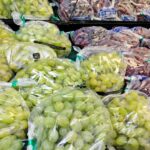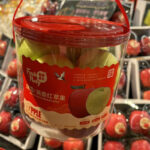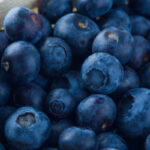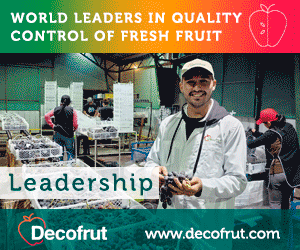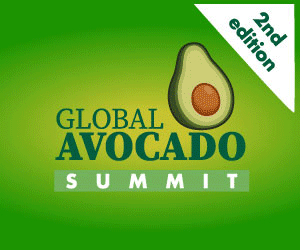China: excess fruit demand drives Joyvio's global sourcing push

Chinese horticultural business Joyvio caught international attention in April with the announcement of a strategic partnership in Chile, and the founder of parent company Legend Holdings Liu Chuanzhi says customers have been "very happy" with the result. During a visit to Santiago last week, Liu and Joyvio managing director Chen Shaopeng caught up with www.freshfruitportal.com to discuss their sourcing strategy, touching on their alliance with Perfection Fresh in Australia and plans in the U.S. Further on the horizon, other Latin American countries may be on the radar.
Chen says the company took three main criteria into account when choosing Subsole as its Chilean partner, after substantial consultations with diplomatic representatives and fruit industry associations.
"Firstly, they have to be a leading companies in the industry with a certain scale and ranking, and the second thing is that they have to be trustworthy and responsible companies," he says.
"The third thing we found through our interactions with Subsole is that they are a company that also has the aspiration to enter into the Chinese market, so between us we have a common goal."
The joint venture with Subsole involves five farms to source blueberries, kiwifruit, walnuts and grapes, while the partnership also entails providing a market platform for these and other Chilean fruits such as cherries.
"We can say that as of now our customers are very happy. We have been seeing an excess of demand, and this is especially true for the early harvest fruits, like cherries and blueberries," says Liu.
"We think that for Chile we have a special advantage because we have a free trade agreement, and that's a very important advantage it has compared to other countries.
"Through our subsidiary Joyvio we have created a trustworthy brand of high quality fruits in China, and it is also our wish to develop this same brand where the fruits are produced, which is Chile."
A similar arrangement Down Under
Chen says the agreement with Perfection Fresh in Australia is "very similar" to what Joyvio has with Subsole, but focused on grapes, cherries, oranges and mandarins.
"Our partner at Subsole, Miguel Allamand, recommended Perfection Fresh as a high quality fruit grower...we also had recommendations about Perfection Fresh from the Australian Embassy in China, as well as some investment banks in China we have worked closely with for our other operations in Legend Holdings," he says.
"The strategies in working with Perfection Fresh are very similar to what we have with Chile, which on one side consists of investment to increase production, and the other consists of building a platform for exports.
"I can say that our collaboration with Perfection Fresh has gone smoothly, and the fruits that end up being exported to China have been well received."
He adds that collaboration with the Australian business will likely increase this Southern Hemisphere summer, following a strong campaign for the country's high quality citrus during Australia's winter.
Supply globalization
Liu wants to ensure that Chinese consumers have high quality fruit all year, which he says requires the "globalization of production", growing fruit both in China and overseas.
"We want to meet the aggregated demand in China and for that we need to look for opportunities to keep expanding, and we are also look for alternate forms of flexible cooperation with other countries," he says.
"For example, in the United States this could be purchasing and sales. I want people to know that China has a great demand for fruit, and while our agricultural subsidiary Joyvio has only a couple of years of history, our headquarters with Legend Holdings is a very influential, capable and trustworthy business in the Chinese market.
"Our total shares are worth CNY180 billion, or more or less US$30 billion - Legend Holdings has a lot of prestige in the Chinese market, and that implies that we are very demanding when looking for a strategic partner."
Chen says it is no secret that the company's strategy in the United States is more or less the same as in Chile and Australia.
"The products that we introduce from the U.S., this has to do with the planning of Joyvio and mainly consists in four products – blueberries, kiwifruit, cherries and grapes," he says.
"We are also open to considering a product that is famous, characteristic of a country that could reach a premium status in China, so in the United States we are importing mainly grapes and cherries.
"The thing is that China is not yet open to imports of blueberries from the United States, and they don't grow much kiwifruit."
He adds that while Joyvio subsidiary Zhong Xin Nong Ye is the country's largest kiwifruit grower, the business sometimes needs to source the fruit from France and Italy to complement supply, however this is not on a large scale and does not involve investments like its alliances in the Southern Hemisphere.
Joyvio's subsidiary Wallen Blueberry Fruits is also the largest blueberry producer in China.
When asked about the possibility of incorporating Chile's neighbors Peru and Argentina into Joyvio's investment base, Chen says they are still under analysis.
"Now we are just following their agricultural industries closely but we haven't done anything concrete - we are also looking at Mexico."
Liu mentions that fruits are just the starting point for Joyvio and it is possible that the business will branch out into other forms of agriculture in the future.
"For example, in organic fertilizers there is a lot to be learned from the techniques used in Chile and applying these in China. We are also working with Chilean experts in blueberry production in China so they can share their techniques and experience.
"As a leader we want to have a complete integrated control of all the steps of fruit production until it reaches a client - that also can solve the issue of food safety and quality."
On a more philosophical note, with childhood obesity on the rise in China, Liu says companies like his can help raise awareness about healthy eating through the production and promotion of fruit. However, he says different factors are at play in eating habits to what has historically occurred in the United States.
"Fast food in the United States is consumed mainly due to a lack of time and money to prepare healthy food, but that's not the case in China," he says.
"Because people in China in the past thought fast food was good food, you can see a gap in the development of the U.S. and China, but now China has a growing middle class and they are trying to not have these habits and live a healthier life.
"For now, we are trying to deepen knowledge about which products are healthy and which aren’t, through television media, and as a company we can play a role in the production and promotion of healthy products."
Related stories: Key Chinese ag investment player bullish on reforms
China's tech sector enjoys fruit of kiwifruit harvest
Chinese ag giant bets on Chilean premium fruit














